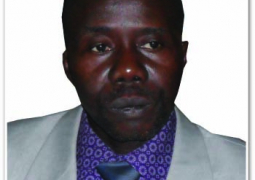
State Counsel
Patrick Gomez on 11 February, 2020, opposed bail before Justice Amina
Saho-Ceesay of the High Court in Banjul for the executive members of 3 Years
Jotna.
Reacting to
his opposition for bail for Abdou Njie, Ebrima Kitim Jarju, Sheriffo Sonko,
Hagi Suwaneh, Fanta Mballow, Karim Touray, Yankuba Darboe and Muctarr Ceesay,
Counsel R. Menday told the court that they have been served by the state with
affidavit in opposition which was defective. She noted that the defence has
filed affidavits for all the accused persons to be granted bail. She referred
the court to the Evidence Act Court Schedule 7.
She submitted
that perusing the affidavit in opposition, it was apparent that the state has
agreed or accepted the originating summons filed by the defence. She said that there was nothing in the
affidavit in opposition denying the originating summons to grant bail. She went
on to say that the state was deemed to have admitted all the averments deposed
by the applicants. “The argument by the state that the application for bail has
been overtaken by events has no basis in law,” she argued.
She stated
that if the court wished the defence to argue on bail application in detail,
they would ask that the application for bail be granted based on the averments.
At this juncture, she cited a Nigerian case to support her argument. “The
accused persons are presumed innocent until proven guilty. The burden to prove
that the accused are not entitled to bail rests on the prosecution,” she told
the court.
She adduced
that the prosecution had failed to provide the court any facts or evidence
which would convince the court to refuse bail.
In his
deliberation, State Counsel Gomez stated that the defence had argued that the
affidavits filed by the state were defective in nature, and that the affidavit
did not contain averments for opposing bail. He added that the defence also
argued that the offences are bailable. “It is the position of the prosecution
that the affidavit does not violate Court Schedule 7,” he submitted.
At this
juncture, he referred the court to the affidavit of Muctarr Ceesay and noted
that the court would observe that paragraph 7 of Court Schedule 7 was complied
with. He said that on the last page of the affidavit , the court would observe
that it had been signed by a Commissioner of Oath. He argued that there was no
requirement that the signature of a Commissioner of Oath should be on the left
side of the document. He cited Section 87 of the Evidence Act to convince the
court.
“The defence
does not argue that the affidavit is not sworn by a person duly authorised. I
urged the court to accept the affidavit,” he said. On the averments, he argued
that the law on application on affidavit was clear. He added that it was
settled that even if a party does not file an affidavit in opposition, it does
not mean that the party is conceding the application.
“There are
two possible situations. One is that the party may rely on the facts or
averments in the affidavit filed by the applicant or to respond on points of
law,” he stated.
In summary,
Counsel Camara rose and told the court that the applicants had adopted the
application and averments in respect of the application for bail. “Having filed
formal application, it is our humble submission that having regards to the law
and the averments in the application, the applicants are entitled to bail,” he
argued.
Counsel Patrick Gomez will further argue on
the opposition of bail on 14 February, 2020.



